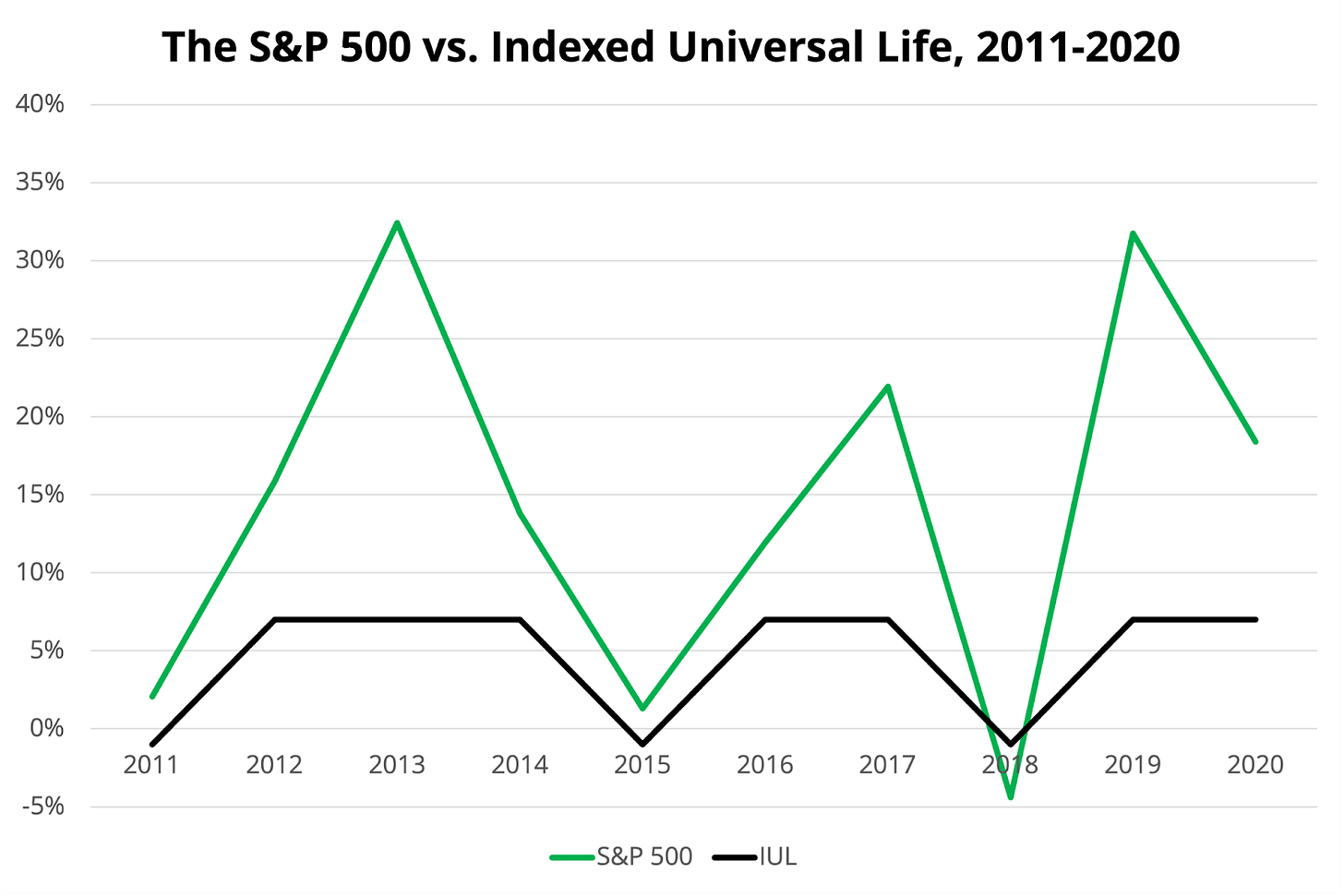All Categories
Featured
Table of Contents
1), usually in an attempt to beat their category standards. This is a straw male debate, and one IUL individuals love to make. Do they compare the IUL to something like the Lead Total Stock Exchange Fund Admiral Show to no load, an expenditure proportion (ER) of 5 basis factors, a turn over ratio of 4.3%, and an extraordinary tax-efficient record of distributions? No, they contrast it to some dreadful proactively taken care of fund with an 8% lots, a 2% ER, an 80% turnover ratio, and an awful document of temporary capital gain distributions.
Mutual funds frequently make annual taxable distributions to fund proprietors, even when the value of their fund has actually decreased in value. Shared funds not just require income coverage (and the resulting annual taxes) when the common fund is going up in worth, however can also enforce income tax obligations in a year when the fund has gone down in value.
That's not exactly how mutual funds work. You can tax-manage the fund, collecting losses and gains in order to minimize taxed distributions to the investors, however that isn't somehow going to transform the reported return of the fund. Just Bernie Madoff kinds can do that. IULs avoid myriad tax catches. The ownership of shared funds might need the shared fund proprietor to pay estimated tax obligations.

IULs are very easy to place to make sure that, at the owner's fatality, the recipient is exempt to either income or inheritance tax. The same tax obligation reduction strategies do not function nearly also with mutual funds. There are various, frequently expensive, tax catches connected with the timed buying and marketing of mutual fund shares, traps that do not put on indexed life Insurance.
Opportunities aren't extremely high that you're mosting likely to be subject to the AMT because of your shared fund distributions if you aren't without them. The remainder of this one is half-truths at ideal. For instance, while it holds true that there is no income tax obligation because of your successors when they acquire the profits of your IUL plan, it is additionally real that there is no income tax due to your heirs when they inherit a mutual fund in a taxed account from you.
No Load Universal Life Insurance
There are far better ways to avoid estate tax obligation issues than buying investments with reduced returns. Shared funds may cause income taxes of Social Safety and security advantages.

The growth within the IUL is tax-deferred and might be taken as tax obligation free earnings via finances. The plan proprietor (vs. the shared fund supervisor) is in control of his or her reportable income, hence allowing them to lower or also remove the tax of their Social Safety and security advantages. This is excellent.
Here's one more very little concern. It holds true if you purchase a mutual fund for say $10 per share prior to the distribution day, and it disperses a $0.50 circulation, you are after that going to owe tax obligations (probably 7-10 cents per share) although that you have not yet had any type of gains.
In the end, it's truly concerning the after-tax return, not how much you pay in taxes. You're also possibly going to have even more cash after paying those tax obligations. The record-keeping demands for owning shared funds are significantly a lot more complicated.
With an IUL, one's records are kept by the insurance provider, copies of yearly declarations are mailed to the owner, and circulations (if any kind of) are completed and reported at year end. This is likewise kind of silly. Obviously you ought to maintain your tax obligation records in instance of an audit.
Indexed Whole Life Insurance Policy
All you need to do is shove the paper into your tax obligation folder when it turns up in the mail. Rarely a reason to buy life insurance coverage. It resembles this man has never ever purchased a taxed account or something. Common funds are generally part of a decedent's probated estate.
In enhancement, they undergo the hold-ups and expenses of probate. The earnings of the IUL policy, on the other hand, is always a non-probate distribution that passes outside of probate directly to one's named beneficiaries, and is for that reason not subject to one's posthumous creditors, undesirable public disclosure, or comparable delays and prices.
We covered this under # 7, however just to wrap up, if you have a taxable shared fund account, you need to put it in a revocable count on (and even easier, utilize the Transfer on Death designation) in order to stay clear of probate. Medicaid incompetency and lifetime earnings. An IUL can offer their proprietors with a stream of earnings for their entire life time, regardless of the length of time they live.

This is advantageous when organizing one's affairs, and converting possessions to income prior to an assisted living home arrest. Shared funds can not be converted in a similar fashion, and are usually taken into consideration countable Medicaid properties. This is an additional dumb one advocating that poor individuals (you know, the ones who need Medicaid, a federal government program for the inadequate, to spend for their assisted living facility) should make use of IUL as opposed to mutual funds.
Iul Dortmund
And life insurance policy looks dreadful when compared relatively against a retirement account. Second, individuals who have cash to buy IUL over and beyond their pension are going to need to be dreadful at handling cash in order to ever get Medicaid to spend for their retirement home expenses.
Chronic and terminal illness motorcyclist. All plans will certainly permit an owner's easy accessibility to cash money from their policy, frequently waiving any kind of surrender charges when such people endure a serious disease, require at-home care, or end up being constrained to a nursing home. Mutual funds do not offer a comparable waiver when contingent deferred sales charges still put on a mutual fund account whose owner requires to sell some shares to fund the costs of such a keep.
Fixed Universal Life Insurance
You get to pay even more for that benefit (cyclist) with an insurance coverage plan. What a lot! Indexed universal life insurance policy supplies death advantages to the recipients of the IUL owners, and neither the proprietor neither the beneficiary can ever before lose cash due to a down market. Mutual funds give no such guarantees or survivor benefit of any kind.
Currently, ask yourself, do you really need or want a survivor benefit? I definitely don't require one after I reach financial independence. Do I want one? I mean if it were affordable enough. Certainly, it isn't inexpensive. Usually, a purchaser of life insurance policy pays for truth cost of the life insurance policy benefit, plus the costs of the plan, plus the earnings of the insurance provider.
Problems With Universal Life Insurance
I'm not entirely sure why Mr. Morais tossed in the whole "you can not shed cash" again here as it was covered fairly well in # 1. He just desired to duplicate the very best selling point for these things I mean. Once again, you don't shed small dollars, yet you can shed genuine dollars, along with face major chance cost because of reduced returns.

An indexed global life insurance policy proprietor might exchange their policy for an entirely various policy without activating revenue tax obligations. A shared fund proprietor can stagnate funds from one common fund business to an additional without offering his shares at the previous (hence causing a taxable event), and repurchasing brand-new shares at the last, commonly based on sales fees at both.
While it is real that you can trade one insurance plan for an additional, the factor that individuals do this is that the first one is such an awful plan that also after purchasing a new one and experiencing the early, unfavorable return years, you'll still appear in advance. If they were marketed the ideal plan the very first time, they shouldn't have any kind of wish to ever before trade it and experience the very early, negative return years once again.
Latest Posts
Accumulation Value In Life Insurance
Iul Insurance Policy
Indexed Universal Life Insurance Calculator